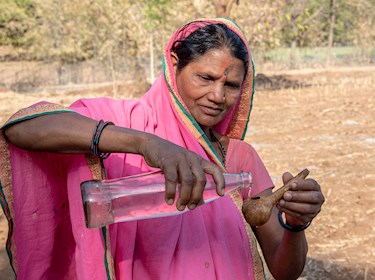
Mahua Carries Santal Tribe’s Liquor Legacy
Made from the pale yellow blossoms of the mahua tree (Madhuca longifolia), this home-brewed liquor has been a part of their culture for centuries, integrating itself into the very fabric of community life, ceremonies, and ancestors' worship.
For Odisha’s Santal tribe, mahua is not a drink, but memory, ritual, and tradition concentrated in each drop. Made from the pale yellow blossoms of the mahua tree (Madhuca longifolia), this home-brewed liquor has been a part of their culture for centuries, integrating itself into the very fabric of community life, ceremonies, and ancestors’ worship.
In Mayurbhanj, Sundargarh, and Keonjhar districts which are inhabited by large populations of Santals, the mahua tree flower bloom is a time of celebration. At sunrise, women with wicker baskets collect the petals which have fallen to the ground, their heady perfume wafting through the air. The flowers are dried and fermented subsequently to make a mildly intoxicating liquor which tastes earthy but is firmly entrenched in tradition. In contrast to industrial alcohol, mahua is brewed at home, sometimes in clay pots, by inherited wisdom.
For the Santals, mahua is not just a party drink, it is full of social and spiritual meaning. Any celebration, a wedding, harvest festival, or social get-together is never complete without it. Mahua is also presented to gods in rituals and offered on the ground as a divine offering to forefathers. Drinking together a cup of mahua implies faith and belongingness and brings people closer in the warmth of family ties.
The production of mahua is also inextricably linked to the tribe’s economy. Families rely on the collection and brewing of flowers as a means of livelihood, selling the liquor or the dried flowers in weekly haats (markets). In fact, apart from its profound cultural significance, mahua has traditionally borne a social stigma, being labeled as “country liquor” by those outside the community. It is this that erodes its heritage and the sustainable nature in which it is produced.
In the last few years, initiatives are being seen to value mahua, not only as a drink but as a heritage beverage. Throughout India, there is increased appreciation of tribal brews for their natural processes and distinctive flavors. In Odisha, also, plans to popularize mahua as a legal and cultural product are being popularized, which may save the tradition as well as the livelihood of the tribal families.
To the Santal tribe, mahua is still a living testament to strength and identity. In its golden nectar is the history of a people—of forests, communal bonds, and an ancient bond with nature. Each sip is, indeed, a sip of heritage.
